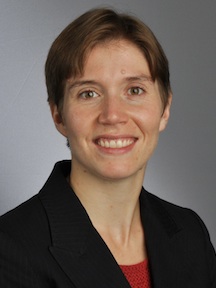By Kevin Wang
As a kid growing up in Los Angeles, Stephanie Neely (ΦBK ’03) knew she wanted to become a scientist – a physicist, to be exact. So in 2001 when she entered Yale University as a mathematically inclined and scientifically inquisitive freshman, she naturally enrolled in an intensive year-long humanities program covering the near entirety of the Western canon. “My parents like to joke that I always like doing the things that are most challenging to me,” Neely says. “There’s some truth to it, but I think that’s almost too self-aggrandizing.”
Though she likes challenges, Neely didn’t enroll in the program, called Directed Studies, merely to satisfy some deeply rooted masochism. “I wanted to branch out from my focus on science and study the humanities as well,” Neely says, “and I ended up finding the humanities both enriching and fascinating.” But first she had to make certain that reading Dante and pondering Kant was the path she wanted to walk. After her freshman year, she interned at the Jet Propulsion Laboratory in Pasadena, California, to give her scientific leanings one last chance to assert themselves. Shortly after returning to school, she officially declared the humanities major.
Neely enjoyed her studies in what was at that time a very small major, which offered only a little over a dozen courses (today the humanities major at Yale has nearly 70 course offerings). She found the academic study of religion particularly interesting and wrote her senior thesis on the Christianity of late antiquity, during the time that Christianity was advancing into the spotlight on the stage of the late Roman empire. Though she considered pursuing a PhD to continue her studies in this historical period, she ultimately decided against it after realizing she wanted to become more engaged in the public sphere, since it was her direct interaction with people within the context of her interests that brought her the greatest fulfillment.
Upon graduating magna cum laude from Yale in 2005, after being inducted into ΦBK in her junior year, Neely enrolled in a dual degree program at Harvard University to earn a combined JD and Master’s in theological studies. While a law student, she put her education to the test by volunteering at pro bono (literally translated “for good”) clinics, in which trained professionals and professionals-in-training offer their services without pay to those who would not be able to afford them otherwise. The cases she encountered, which ranged from social security to eviction, were not easy. But in Neelian fashion, their difficulty only encouraged her. “It was intellectually challenging subject matter,” she says, “and law school was giving me the tools to solve intellectual challenges in the context of making concrete differences in people’s lives and in society.” She had found her path.
Today, Neely works as an intellectual property lawyer at the Wilmer Hale law firm in Boston while continuing the pro bono work that originally brought meaning to her career in law. Within her specific expertise of intellectual property, she sees signs of a reigniting of her childhood passion for science and an evidence-based approach to life. “I see law as something between two spheres, those of interpersonal relationships and evidence,” she says.
Though a professional focused on one area of expertise, Neely sees her broad education in the humanities at Yale contributing to her work on a daily basis. “Legal problems are just one part of a whole constellation of things going on with an individual,” she says. “In the humanities major, we were given a framework of a larger vision of the way that society works. Carried over to law, that means understanding that a specific set of legal tools doesn’t cover everything.”
As for her interest in religion, Neely explains that she is in a constant state of undercurrent brain storming as she waits for the right time to incorporate it into her litigation career. But Neely says her decision to study religion was never part of a master plan to craft some unique and multi-dimensional career. Rather, she champions the exposure to different “spheres of life” for its own sake, as an essential part of what it means to be human. Neely expresses how lucky she feels for having had the opportunity to learn about so many different spheres of human existence, and the diverse exposure is in and of itself, she argues, a thing to be treasured greatly.
Such a diversity of experience not only enhances our own sense of humanity, but also enables us to bond with others over this common humanity. “I do worry about people’s ability to talk to one another,” Neely says. “I think appreciating different ways of understanding the world can enable people to live well together.” And this may be the thread that runs through all the different interests she has entertained, the side trails whose mysteries she has indulged. Diversity, differences, and change – the very things that seems to pull things apart may in fact be the most crucial for holding them together.
Kevin Wang is a senior at Yale University majoring in molecular biophysics and biochemistry. He was elected to ΦBK as a junior and is currently serving as vice-president of the Yale Phi Beta Kappa chapter. Yale is home to the Alpha of Connecticut Chapter of Phi Beta Kappa, founded in 1780.
Follow Kevin on Twitter @kkwang23.




